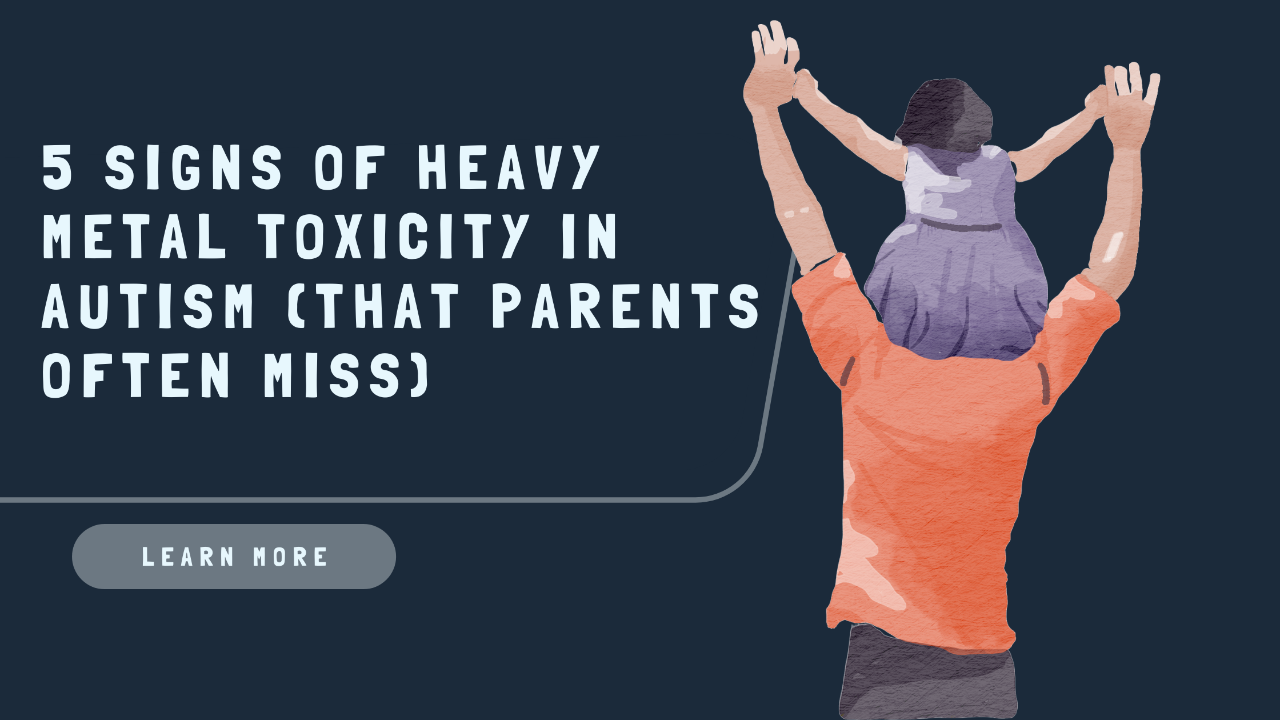Heavy Metal Toxicity in Autism: Signs, Symptoms, and What Parents Need To Know
Aug 28, 2025
Most autism parents have been trained to believe the answer lies in more testing. Hair tests. Stool tests. $500+ panels that often come back confusing or inconclusive.
But here’s the truth: you don’t always need a test to know if heavy metals are part of your child’s struggle. The body often shows very clear signs—if you know what to look for.
And if heavy metals like mercury, lead, aluminum, and arsenic are slowing down your child’s brain and nervous system, you’re going to see the clues show up in behavior, digestion, mood, and development.
Why Heavy Metals Hit Harder in Autism
Heavy metals aren’t new. They’ve always existed in the Earth’s crust. But modern life has amplified exposure in ways our bodies weren’t designed to handle:
-
Lead in water pipes and old paint
-
Mercury in fish and dental fillings
-
Aluminum in cookware, packaging, and even some medical exposures
-
Arsenic in rice and contaminated soil
-
Antimony and other metals in clothing and textiles
For many children on the spectrum, detox pathways are slower. That means instead of being cleared, metals accumulate—impacting the gut, the nervous system, and the brain.
The result? A child whose body is in constant overwhelm, making speech, sleep, and connection feel impossible.
5 Common Signs of Heavy Metal Toxicity in Autism
Here are five of the most telling signs I see in autistic kids when metals are weighing them down:
- Regression After Illness or Exposure
Loss of skills, eye contact, or speech following illness, a medical procedure, or environmental exposure. Many parents blame “the one event” (like a well visit), but what’s really happening is that the child’s system was already overburdened—and couldn’t bounce back. - Neurological Symptoms
Tremors, clumsiness, unusual muscle tone, or an unsteady gait. Kids who bump into everything, elope frequently, or seem disconnected from spatial awareness may be showing neurological signs of heavy metals. - Extreme Sensory Reactions
Light, sound, and touch sensitivity that flare unpredictably. One week your child tolerates noises, the next week even gentle sounds are unbearable. These swings often point to toxins straining the nervous system. - Digestive Disruption
Persistent constipation, diarrhea, or gut imbalances not explained by diet alone. Heavy metals create “pockets” in the gut that attract parasites and fuel dysbiosis—something we see in the majority of kids on the spectrum. - Behavioral Shifts Out of the Blue
Sudden aggression, anxiety, or self-injury without a clear trigger. These aren’t “just behaviors.” They’re biology. A nervous system under toxic stress can look like rage, fear, or meltdown.
Why Testing Isn’t Always the Answer
Yes, testing can provide information. But here’s what most parents don’t know:
-
Metals don’t shed evenly, so a single test may miss the mark.
-
Results often tell you exposure happened—but not how it’s impacting your child’s daily function.
-
Many families spend thousands on labs, only to feel more confused.
Symptoms, combined with a professional assessment, are often a more reliable guide.
Food-First Support for Heavy Metal Detox
Here’s the good news: you don’t need aggressive chelation protocols or endless supplement stacks. In fact, those approaches can backfire.
Instead, we use a food-first lifestyle medicine approach that supports the body’s natural detox pathways safely:
-
Mineral-rich foods to push metals out of cells
-
Food binders like beans, lentils, and fiber to “carry out” toxins
-
Gut repair foods to restore balance after metals disrupt digestion
-
Simple environment swaps (water filters, safe cookware) to reduce ongoing load
The changes we see when metals are addressed can be profound:
-
Kids moving from non-verbal to speaking in sentences
-
Families celebrating birthdays where their child sings along for the first time
-
Less aggression, calmer moods, more focus
-
Better sleep and energy
Every Child is Different
Not every child with autism has heavy metal toxicity. For some, the bigger issue may be nutritional deficiencies, chronic infections, or gut dysbiosis. That’s why personalization matters.
But if you’re seeing the signs above, supporting detox gently—through food, minerals, and lifestyle—can be life-changing.
Stay connected with news and updates!
Join our mailing list to receive the latest news and updates from our team.
Don't worry, your information will not be shared.
We hate SPAM. We will never sell your information, for any reason.

